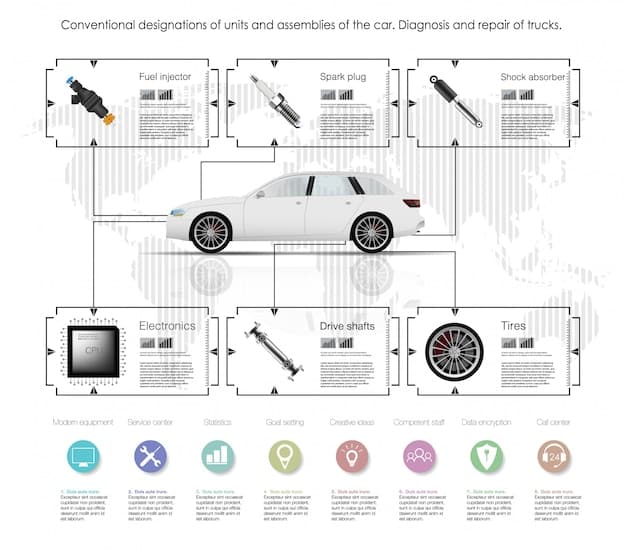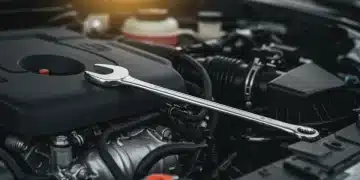Car Buying Guide 2025: Navigating Extended Warranties & Service Contracts
Car Buying Guide 2025: Deciphering the Fine Print of Extended Warranties and Service Contracts is crucial for making informed decisions, understanding their benefits and limitations, and ensuring financial protection against unexpected repair costs, empowering car buyers to navigate these options confidently.
Navigating the world of car buying can be overwhelming, especially when it comes to understanding the intricacies of extended warranties and service contracts. Our Car Buying Guide 2025: Deciphering the Fine Print of Extended Warranties and Service Contracts will help you make informed decisions and protect your investment.
Understanding Extended Warranties
Extended warranties, also known as vehicle service contracts, provide coverage beyond the manufacturer’s original warranty. They are designed to protect you from unexpected repair costs after the factory warranty expires.
These warranties aren’t just for new cars; they can also be purchased for used vehicles, offering peace of mind regardless of the car’s age.
What Do Extended Warranties Cover?
The coverage offered by extended warranties can vary significantly. Here are some common components and systems they may include:
Drivetrain Coverage
Typically, covers engine, transmission, and related components. Protects against major mechanical failures.
Electrical System Coverage
Includes protection for the car’s electrical components like the starter, alternator, and wiring.
Air Conditioning Coverage
Covers the air conditioning system, protecting against malfunctions and repairs needed for components such as the compressor and condenser.
High-Tech Components Coverage
Covers advanced technology features in modern vehicles.
- Engine: Protects against mechanical breakdowns, including pistons, crankshaft, and cylinder heads.
- Transmission: Covers repairs and replacements of gears, shafts, and the transmission case.
- Electronics: May cover the car’s computer, sensors, and other electronic components.
- Steering and Suspension: Coverage for power steering, shocks, struts and other related parts.

Knowing what is covered ensures you can budget effectively and avoid unexpected expenses.
Service Contracts: A Comprehensive Overview
Service contracts are agreements between you and a provider that cover specific services and repairs for your vehicle. They differ from extended warranties in their scope and coverage.
These contracts often include routine maintenance, such as oil changes and tire rotations, along with certain repairs.
What Services Are Typically Included?
Service contracts generally cover a range of services aimed at keeping your car in good condition. Key inclusions are:
Routine Maintenance
Covers regular services such as oil changes, filter replacements, and tire rotations, helping to maintain the vehicle’s performance and longevity.
Wear and Tear Items
Covers the replacement of parts that wear out over time, such as brake pads, belts, and hoses, ensuring the vehicle remains in optimal condition.
Diagnostic Services
Covers diagnostic tests to identify underlying issues and potential problems.
- Oil Changes: Regular oil changes to keep the engine running smoothly.
- Tire Rotations: Ensuring even tire wear and extending the life of your tires.
- Fluid Checks: Monitoring and topping off essential fluids like coolant, brake fluid, and power steering fluid.
Assessing Your Needs and Driving Habits
Before deciding on an extended warranty or service contract, evaluate your driving habits and vehicle needs. This assessment will help you determine the most suitable option for you.
Consider how frequently you drive, the typical conditions, and the age and reliability of your car.
Mileage and Usage
High mileage drivers should consider extended warranties or service contracts more seriously. The more you drive, the higher the likelihood of needing repairs. Key considerations include:
City vs. Highway Driving
City driving often puts more stress on a vehicle due to frequent stops and starts. Extended warranties or service contracts may have the most benefits for those who drive in urban environments.
Frequency of Long Trips
Extended warranties can provide peace of mind for long trips, protecting against breakdowns far from home.
Consider if you are taking long trips often. That might sway you to have some coverage.
Comparing Costs and Coverage Options
Comparing costs and coverage options is crucial to ensure you are getting the best value for your money. Research different providers and carefully analyze the fine print of each contract.
Look beyond the initial price and consider factors like deductibles, coverage limits, and exclusions.
Factors Affecting the Price
Several factors influence the cost of extended warranties and service contracts. These include:
Vehicle Age and Mileage
Older cars with higher mileage generally have higher premium. This is due to the increased probability of needing repairs.
Coverage Level
Comprehensive coverage including more components and services is more expensive than basic coverage.
Deductible Amount
Contracts with lower deductibles cost more but reduce out of pocket expenses when repairs are needed.

Reading the Fine Print: What to Watch For
Carefully reading the fine print is essential when considering extended warranties and service contracts. Understanding the terms and conditions can help you avoid future disputes and maximize the benefits of your coverage.
Pay attention to exclusions, limitations, and cancellation policies.
Common Exclusions and Limitations
Extended warranties and service contracts often come with exclusions and limitations. Common ones include:
Pre-Existing Conditions
Typically exclude coverage for repairs needed as a result of pre-existing issues. They only cover issues that arise after the contract has been in effect.
Wear and Tear Items
Some contracts exclude wear and tear items such as tires, brake pads, and wiper blades, or may only cover them for a limited time.
Neglect or Abuse
Damage resulting from neglect or abuse, such as failing to perform routine maintenance, is not covered.
Making an Informed Decision in 2025
Staying informed about the latest trends and changes in the automotive industry is key to making the best decisions about extended warranties and service contracts in 2025. Technological advancements and evolving market conditions can impact the value and relevance of these protections.
Research current options, read customer reviews and consult with trusted advisors to decide if an extended warranty or service contract is the right choice for you and your vehicle in 2025.
Impact of Electric Vehicles (EVs)
With the rise of electric vehicles (EVs), extended warranties and service contracts are evolving to meet the unique needs of EV owners. Considerations include:
Battery Coverage
One of the most critical aspects of EV coverage, as battery replacements can be costly. Extended warranties may offer specific protection for the battery pack.
Electric Components
EVs have fewer moving parts compared to traditional vehicles, but their electric components require specialized care. Coverage for the motor, charging system, and other electronic components is very useful.
Understanding the coverage and limitations described in the agreement is critical to ensure you’re not left with unexpected costs.
| Key Point | Brief Description |
|---|---|
| 🛡️ Extended Warranty | Covers repairs after the manufacturer’s warranty expires. |
| 🛠️ Service Contract | Includes routine maintenance and some repairs. |
| 💰 Cost Comparison | Evaluate costs, deductibles, and coverage limits to find the best value. |
| ⚡ Electric Vehicles | Consider battery and electric component coverage for EVs. |
Frequently Asked Questions
▼
An extended warranty covers repairs for mechanical failures after the manufacturer’s warranty expires. A service contract, however, typically includes routine maintenance like oil changes in addition to some repairs.
▼
The value depends on your risk tolerance, the vehicle’s reliability, and potential repair costs. If you prefer predictability and peace of mind, an extended warranty may be worthwhile.
▼
Service contracts usually cover routine maintenance such as oil changes, tire rotations, and fluid checks. Some also include certain repairs or replacements of wear-and-tear items like brake pads.
▼
Consider your driving habits, vehicle’s age, mileage, and maintenance history. High-mileage drivers or owners of older vehicles may benefit more from these protections.
▼
Pay close attention to exclusions, limitations, and cancellation policies. Understand what’s not covered, any mileage or time limits, and how to cancel the contract if needed.
Conclusion
In summary, understanding the fine print of extended warranties and service contracts is essential for any car buyer in 2025. By carefully assessing your needs, comparing options, and reading the contract details, you can confidently choose the best protection for your vehicle.





